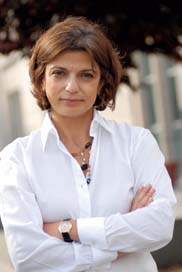|
January 2009
Faculty Focus: Dina Khoury

Professor Dina Khoury is exploring the combat experiences of Iraqi war veterans and their life after the frontlines.
|
By Julia Parmley
When Associate Professor of History and International Affairs Dina Khoury was growing up in Lebanon during the country’s civil war, militias roamed the streets of her neighborhood. She could not cross from one section of Beirut to the other without being stopped at a checkpoint.
“I remember that very suddenly these militias became the government,” says Dr. Khoury. “There was no rule but their rule, but there was order in the chaos. I wondered how people could survive in such a radically changed environment.”
Dr. Khoury is now exploring that very question with her project “War and Remembrance in Iraq.” With support from a Guggenheim Fellowship and the American Academic Research Institute of Iraq, Dr. Khoury traveled to Jordan and Syria last summer and will return to both countries in the spring to interview Iraqi veterans living there about their war experiences. Her research will be published in a book for Cambridge University Press.
Originally a scholar of early 19th-century Iraq, Dr. Khoury became interested in modern day Iraq after the 2003 U.S. invasion. Her current research focuses on the ways in which two groups of veterans—intellectuals who wrote about the experience and infantry men who were members of the armed forces—remember their time on the frontlines.
“I am so struck by the fact that Iraqi society has been at war since 1980,” she says. “My research examines how it understands, copes with, and survives these wars.” She is exploring issues such as how the understanding of martyrdom changed over the course of 20 years and how rights and compensations for families were affected by international sanctions in the 1990s.
Dr. Khoury is also examining how soldiers’ lives were portrayed by the media and the extent to which these portrayals reflected reality. “This is where my interviews with veterans become important,” she says. “War was portrayed as glamorous and heroic, but most of my interviewees did not confirm this.”
The suffering and loss of life Iraq has experienced in the past 30 years is staggering, says Dr. Khoury, explaining that more than 700,000 men died in the Iran-Iraq war and the first Gulf War and that the second conflict led to “the victimization of many Iraqis and a dismantling of their society.
“The sanctions imposed on Iraq were the most comprehensive and longest ever imposed on a country,” she says. “It led to the death of many children and the disintegration of the health and educational system. The middle class was wiped out, and rates of illiteracy increased.”
To find Iraqi veterans, Dr. Khoury followed tips and referrals from friends, families, and community members. She met soldiers and intellectuals from all segments of society—Shiites, Sunnis, Christians, and Mandaens—in cafes, churches, and mosques over her 10 weeks in Jordan and Syria. She notes that many of the Iraqis meet regularly despite their political and religious differences.
“The shared fate of being Iraqi refugees has brought them together,” she says.
Dr. Khoury says she discovered that many of them thought that the Iran-Iraq war needed to be fought to protect Iraq but that the first Gulf War was a useless war fought for the vanity of Saddam Hussein.
“They did not feel their country needed another war, so many of them did not show up,” she says. “Those who did tell stories that are extremely affecting. There was a lot of despair, hunger, and a sense that everything was lost, including their country.”
She says it took some of the men time to become comfortable sharing their intimate thoughts from combat. Dr. Khoury encouraged them to recreate their experience on the front and learned that many of them would have singing competitions or talk about their wives and girlfriends to pass the time in the trenches. Dr. Khoury currently has more than 28 interviews on tape, with some of the interviews lasting several hours over multiple sessions.
“A lot of my research feeds off of my teaching at GW,” says Dr. Khoury, who joined the University in 1991 and currently teaches courses on the history of the Middle East, Islam, and war.
“Going into the classroom raises a lot of questions for me to go back and think about,” she adds.
“I have had several students who had served in Iraq or were going to be deployed there and these are the students that ask the hardest questions,” she says.
Dr. Khoury has lived in the greater Washington, D.C., area for 30 years. She now resides in McLean, Va., and spends her free time hiking in Harper’s Ferry, Sugarloaf, and Great Falls. She enjoys reading mystery novels and watching Law and Order, CSI: Las Vegas, The Wire, and The Sopranos. And she loves the time she spends on campus.
“I have special feelings for GW,” says Dr. Khoury. “Because we have such an informed student body and are in Washington, we always need to explain how history is important. I am intellectually challenged by my colleagues and my students.”
Send feedback to: bygeorge@gwu.edu
|
|

|

